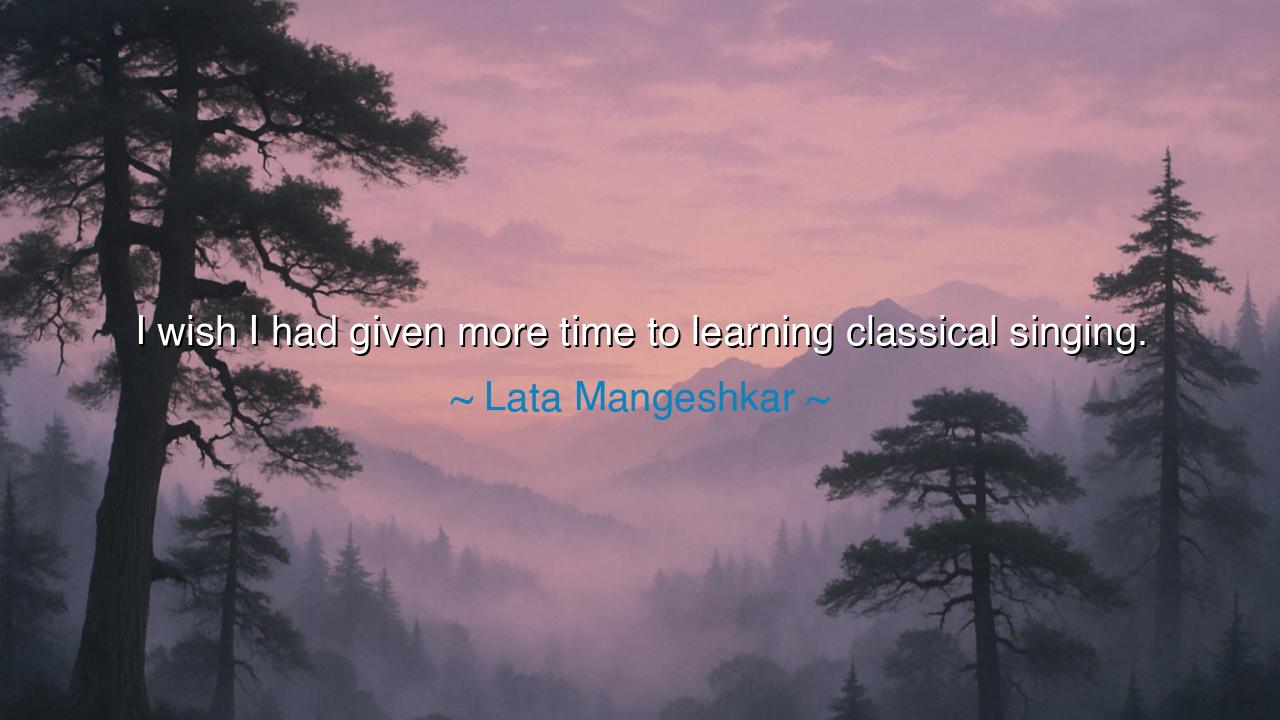
I wish I had given more time to learning classical singing.






There are words that hum like distant music — soft yet filled with power — when they fall from the lips of the great. Lata Mangeshkar, the “Nightingale of India,” once said: “I wish I had given more time to learning classical singing.” These words, spoken by a woman whose voice had already touched the heavens, may surprise the world. For if one so accomplished still speaks with humility, then her regret is not of failure but of aspiration eternal — the yearning of the artist who knows that mastery has no end. Within her simple reflection lies an ancient and noble truth: that the path of learning stretches far beyond achievement, and that the greatest souls are those who never cease to learn.
The meaning of this quote lies not merely in the realm of music, but in the deeper philosophy of lifelong growth. Lata Mangeshkar, though revered across generations, recognized that true art is infinite — that there is always more to explore, more to refine, more to understand. To “learn classical singing” was not for her a matter of fame or recognition; it was a pursuit of essence, of the purest connection between sound and spirit. Her words remind us that excellence is not a destination but a devotion — a continual act of humility before the vastness of knowledge. Even the most luminous stars, when they gaze at the cosmos, see how much remains beyond their light.
The origin of these words emerges from a lifetime spent in discipline and reverence for music. Born in 1929, Lata Mangeshkar began singing as a child, training under her father, a classical musician. Yet, as her career in cinema blossomed, her focus turned toward playback singing — a form that required emotion, adaptability, and versatility more than rigorous classical depth. She conquered this art so completely that her name became synonymous with melody itself. And yet, in the silence of reflection, she longed for more time — more moments to sit at the feet of her teachers, to delve deeper into the sacred structure of raga and rhythm, to perfect what even perfection could not contain. Her regret was not lamentation, but wisdom born of experience — the realization that time, once spent, can never be summoned again.
This sentiment has echoed through the voices of the wise across ages. Leonardo da Vinci, at the end of his life, confessed: “I have offended God and mankind because my work did not reach the quality it should have.” The man who painted the Mona Lisa and imagined flying machines still felt incomplete. Similarly, the philosopher Confucius said, “Real knowledge is to know the extent of one’s ignorance.” Such humility is the hallmark of greatness. The higher one ascends in mastery, the more one perceives the infinite peaks still ahead. Thus, when Lata Mangeshkar spoke of her wish to learn more, she was not diminishing her achievements — she was revealing the **boundless nature of true learning






AAdministratorAdministrator
Welcome, honored guests. Please leave a comment, we will respond soon